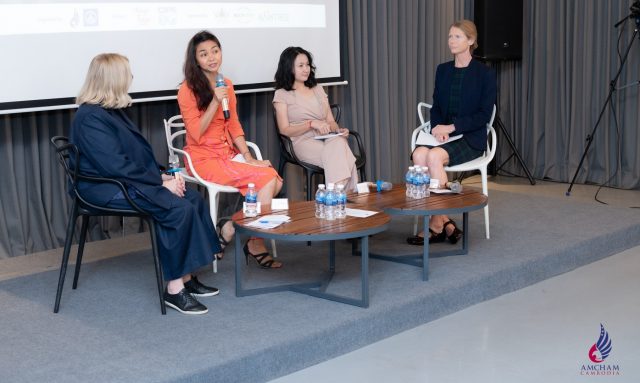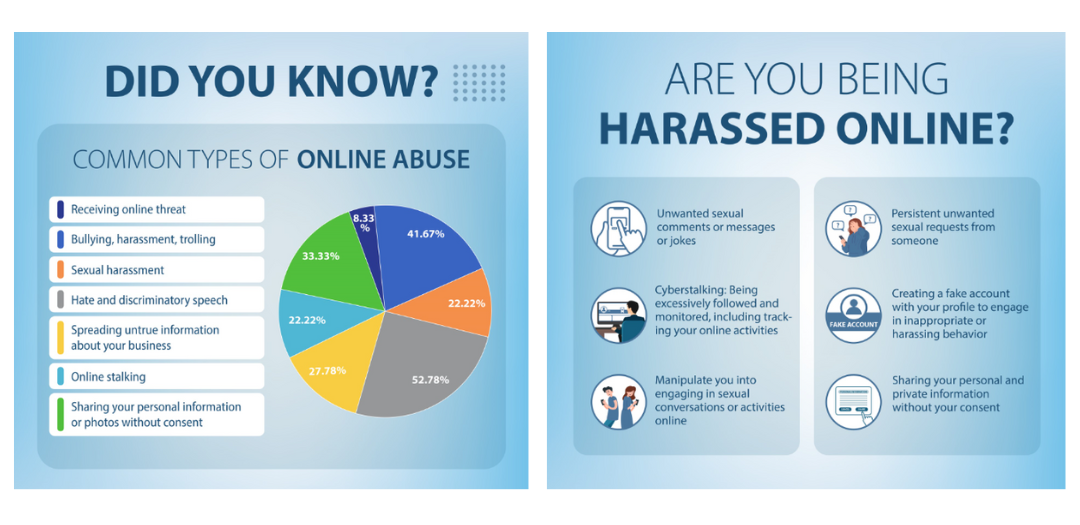The Center for International Private Enterprise (CIPE) is committed to promoting economic inclusion for women in Southeast Asia by increasing women’s participation and representation in the policy process. We seek to accomplish these objectives by supporting the creation of leadership opportunities in the private sector and creating safer digital spaces that foster democratic values.

Globally, gender-based violence and harassment (GBVH), primarily perpetrated against women, is an entrenched social, cultural, and legal problem. The private sector should do more to combat GBVH, but most businesses do not consider it to be a top priority. Business associations and chambers often consider GBVH to be a socio-cultural issue, and believe that openly addressing it falls outside the scope of their missions and activities. On the other side, when these organizations want to address GBVH at work, GBVH is still framed as an issue that only impacts women, which fails to acknowledge the society-wide challenges it creates. As noted in a CIPE research report on GBVH and women’s economic empowerment, at its core, technology-facilitated gender-based violence and harassment (TFGBVH) “hinders women’s participation in the economy and their overall economic empowerment. This framing allows CIPE to address these issues by tying them into a broader shared goal of removing barriers to women’s economic inclusion and participation.”
To address TFGBVH in Cambodia, on December 19 the American Chamber of Commerce Cambodia (AmCham Cambodia) hosted a hybrid conference in Phnom Penh, Cambodia, entitled “Technology, the Law, and Cyberbullying.” CIPE and Cambodia partner MangoTango Asia were invited to present as the conference examined TFGBVH in Cambodia and the roles of civil society and the private sector in addressing it.
Technology-facilitated gender-based violence and harassment “hinders women’s participation in the economy and their overall economic empowerment…”
The conference kicked off with CIPE Program Director for Asia & the Pacific Jennifer Anderson introducing CIPE’s Center for Women’s Economic Empowerment (CWEE) work around the world, and MangoTango Chief Strategy Officer Nancy Jaffe followed with a presentation of MangoTango’s CIPE-supported research findings. MangoTango’s presentation was one of the highlights of the conference due to its interactive language exploration.
MangoTango, with technical support from CIPE, conducted a research project to survey Cambodian women business owners and entrepreneurs. The researchers sought to understand the primary drivers for and barriers to success in digital transformation. The survey findings identified TFGBVH as a significant obstacle to all women in the workforce. However, Cambodian women were not comfortable discussing TFGBVH, and there is no standardized or accepted translation of GBVH or TFGBVH. Although there is language in Khmer, it is not consistent or legally defined, which means no laws and regulations adequately address TFGBVH. Because TFGBVH terminology is not standardized, some behaviors are not clearly understood to be unacceptable by potential victims and perpetrators, which contributes to victims not speaking out. It must be noted that a major reason that victims do not speak out are the power dynamics at play. GBVH is rooted in gender inequality and unequal power relations between the victim and perpetrator, thus disincentivizing victims from reporting it.

From here, MangoTango determined the need to better understand how to talk about TFGBVH issues and solutions in consideration of the Khmer language and local cultural expectations. Through insights from key informant interviews (KIIs), MangoTango developed a communications strategy and social media campaign that address TFGBVH perceptions and concerns in a way that is relevant to Cambodians.
The messaging strategy aims to:
- create awareness of what behaviors are considered TFGBVH,
- inform victims that they are not alone,
- motivate victims to seek help, and
- educate the public on the laws that exist and how to report TFGBVH. Significantly, MangoTango is contributing to the development of new vocabulary and terminology to meaningfully discuss TFGBVH in Khmer.
This is done through message testing different vocabulary and terminology in Khmer through online surveys and focus group discussions (FDGs) to better understand what words related to TFGBVH resonate with Cambodians.
Additionally, the conference included a breakdown of the technology behind TFGBVH, an analysis of the legal status of TFGBVH in Cambodia by Soromnear (Romnear) Sin, Legal Consultant for the Cambodian legal and tax firm DFDL. Sin presented an assessment of the current legal framework that could potentially address TFGBVH, indicating the legal framework’s gap and the critical need for new legislation. The panel discussion with audience questions was facilitated by Jaffe with subject matter experts. Featured panelists were Lim Solinn, CEO and Founder of Saddhā Management and Policy Consultancy, Sokunthea Hang, Communication Specialist and Consultant, and CIPE Program Director Jennifer Anderson. The conference ended with a networking component that allowed attendees to continue the discussions with speakers, panelists, and fellow participants.
Survey findings identified TFGBVH as a significant obstacle to all women in the workforce. However, Cambodian women were not comfortable discussing TFGBVH, and there is no standardized or accepted translation of GBVH or TFGBVH.
The conference attracted a diverse audience of over 80 in-person and 153 online attendees, half of whom were male. The audience represented public sector companies, micro, small, and medium enterprises (MSMEs), universities, development organizations, and media outlets. The conference’s diverse participation is promising, as addressing TFGBVH and women’s economic empowerment (WEE) requires a holistic approach and the involvement of all members of society.
Overall, the conference supported CIPE’s global WEE efforts by raising awareness of TFGBVH’s prevalence in Cambodia and building understanding and localized tools to meaningfully discuss TFGBVH. CIPE and its partners will continue to share updates about WEE initiatives in Southeast Asia via the cipe.org website and social media channels on Twitter, Facebook, and LinkedIn. Through ongoing efforts, CIPE and its partners are helping to break down the barriers that women face in the private sector and promote the economic empowerment of women throughout Southeast Asia.
Published Date: January 30, 2024